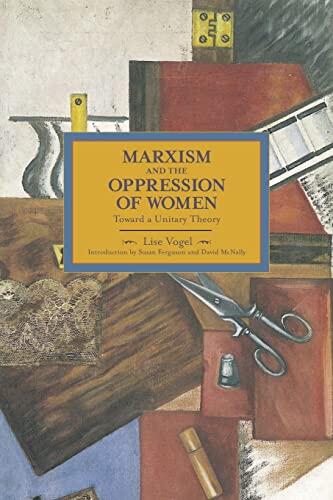
Marxism and the Oppression of Women: Toward a Unitary Theory
Brak ocen
Format
Miękka okładka
Strony
266
Język
Angielski
Opublikowany
Jan 26, 2014
Wydawca
Haymarket Books
Wydanie
Reprint
ISBN-10
1608463400
ISBN-13
9781608463404
Opis
In a compelling examination of the intersection between Marxist theory and feminist thought, Lise Vogel delves deeply into the historical context and material conditions that contribute to the oppression of women. By weaving together insights from both Marxism and feminist critiques, Vogel seeks to construct a cohesive framework that addresses the complexities of gender inequality through a historical materialist lens.
Her argument challenges traditional Marxist narratives that often sideline women's roles and contributions, advocating for a more inclusive understanding of class struggle that recognizes the vital connections between capitalism and patriarchy. Through meticulous analysis, Vogel underscores how the economic systems of power are intertwined with the subjugation of women, pushing readers to rethink the structures of oppression.
Vogel's work encourages a dialogue between various strands of feminist theory, suggesting that a unitary theory can emerge from these discussions, one that emphasizes solidarity and collective struggle. By integrating both historical and contemporary perspectives, she offers a fresh lens through which to consider the ongoing fight for gender equality.
Ultimately, Vogel's exploration is not just theoretical; it serves as a call to action for those committed to dismantling systemic inequities in society. This book invites readers to engage with the material realities of women's lives while also fostering a profound understanding of the ongoing interplay between economic systems and gender dynamics.
Her argument challenges traditional Marxist narratives that often sideline women's roles and contributions, advocating for a more inclusive understanding of class struggle that recognizes the vital connections between capitalism and patriarchy. Through meticulous analysis, Vogel underscores how the economic systems of power are intertwined with the subjugation of women, pushing readers to rethink the structures of oppression.
Vogel's work encourages a dialogue between various strands of feminist theory, suggesting that a unitary theory can emerge from these discussions, one that emphasizes solidarity and collective struggle. By integrating both historical and contemporary perspectives, she offers a fresh lens through which to consider the ongoing fight for gender equality.
Ultimately, Vogel's exploration is not just theoretical; it serves as a call to action for those committed to dismantling systemic inequities in society. This book invites readers to engage with the material realities of women's lives while also fostering a profound understanding of the ongoing interplay between economic systems and gender dynamics.
Recenzje
Nie ma jeszcze recenzji
Bądź pierwszy, aby zrecenzować tę książkę i podziel się swoimi przemyśleniami
Dodaj pierwszą recenzjęDziennik czytania
Nie znaleziono dzienników czytania
Zacznij śledzić swój postęp w czytaniu, aby zobaczyć logi tutaj
Dodaj swój pierwszy dziennik czytaniaNotatki
Dziennik transakcji
Nie znaleziono dzienników transakcji
Zacznij śledzić swoje transakcje książkowe, aby zobaczyć logi tutaj
Dodaj swój pierwszy dziennik transakcji


















